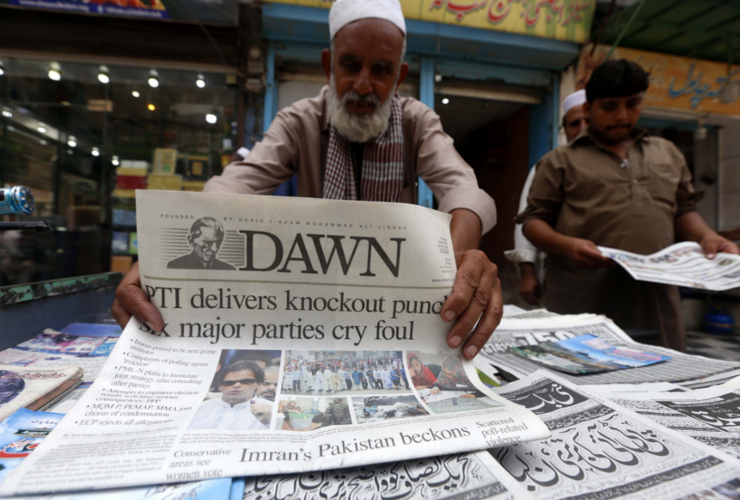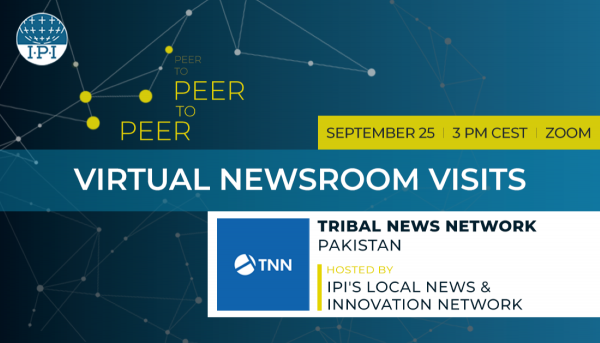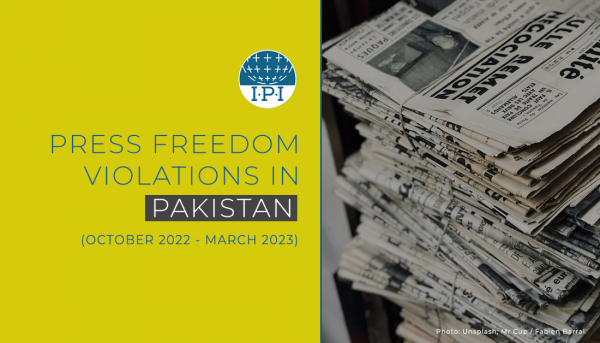The International Press Institute (IPI) this week called on Imran Khan, who is poised to become Pakistan’s next prime minister, to reverse a deteriorating environment for the independent press in the country.
Khan’s Tehreek-e-Insaf party topped Pakistan’s parliamentary vote last month and is now expected to lead a coalition government. The development comes as Pakistan’s media face increasing threats, including violence, disruption of newspaper distribution and the blockading of television broadcasts.
Prior to the election, IPI expressed concern that the Pakistan military appeared to be increasing pressure on the country’s media so as to impose a narrative of its own choosing with relation to its involvement in civilian affairs.
In a letter sent to Khan this week, IPI Executive Director Barbara Trionfi urged the former cricket star to set a new course.
“While the citizens of Pakistan are looking forward to a change in the governance of the country and hope that it will be free of corruption and coercion, the IPI network expects that you will restore media freedom and create an environment where journalists and media organizations are able to function without fear”, she said.
The ongoing attacks on independent media, she added, create a climate “inimical to both democracy and the free flow of information necessary for a strong and corruption-free democracy that you have promised to usher in to create a new Pakistan”.
Read the full letter below.
His Excellency Mr. Imran Khan
Chairman, Pakistan Tehreek-e-Insaf
Islamic Republic of Pakistan Islamabad Pakistan 13 August 2018
Your excellency Mr. Khan,
The International Press Institute (IPI), a global network of editors, media executives and leading journalists in over 100 countries, would like to congratulate you and the Pakistan Tehreek-e-Insaf party on the success in the recent elections. The people of Pakistan have demonstrated faith in you and PTI has emerged as the largest single party in the National Assembly.
While the citizens of Pakistan are looking forward to a change in the governance of the country and hope that it will be free of corruption and coercion, the IPI network expects that you will restore media freedom and create an environment where journalists and media organizations are able to function without fear.
As we had written to you on June 12, our global network is deeply concerned about the high-handed use of coercive measures to curtail the independence of the press in Pakistan. These coercive measures include, but are not limited to, the physical intimidation, abduction and torture of dissenting journalists; the forcible denial of access by independent newspapers to readers through the widespread disruption of distribution; and the effective blockading of independent channel broadcasts to television audiences. Such actions constitute an attempt to impose a forced political narrative on Pakistan’s current options in governance, a narrative in which the military’s overarching role in matters pertaining to civilian affairs continues to remain unquestioned.
Just before the elections a senior woman journalist, Gul Bokhari, from the Nawai Waqt/ Nation Group, was abducted for several hours, late at night, while on her way to work. The same night, another broadcast journalist, Asad Kharal, was physically assaulted in Lahore. These incidents occurred one day after a press conference held by the Director General of Inter-Services Public Relations in which he displayed a chart of prominent journalists and activists effectively described as ‘anti-state elements’. Numerous newspaper editors have been forced to drop dissenting columns from newspapers, leading some columnists to post their uncensored columns on social media platforms.
Equally disturbing has been the nationwide use of intimidation against distributors of newspapers. Groups of officials continue to physically stop newspaper distribution vans and agents from delivering targeted national dailies such as DAWN, Jang and The News. This occurs daily in large metropolitan residential areas and in medium-sized towns, particularly in military cantonments and military-administrated residential societies, housing large civilian populations. Identical tactics are being deployed against cable operators affiliated to the Electronic Media Regulatory Authority, with respect to news channels such as GEO and DAWN News, which are being regularly blocked from reaching audiences.
Excellency, you are well aware that such a climate is inimical to both democracy and the free flow of information necessary for a strong and corruption-free democracy that you have promised to usher in to create a new Pakistan.
IPI is worried that the continued persecution of the independent media is designed to convey a clear message – that any criticism of the military’s involvement in civilian affairs will have dire consequences for the survival of an independent press in Pakistan.
We therefore call upon Your Excellency to do everything possible to ensure that the deteriorating environment for the independent press is reversed, and that the press be protected from the onslaught of state institutions. Unless rigorous measures are taken to halt further attempts to influence reporting in the media, and to ensure that newspapers are allowed to publish freely, and television channels are allowed to broadcast in Pakistan without any further harassment, it will be hard to establish a vibrant democracy.
We thank you for your attention.
Yours sincerely,
Barbara Trionfi
Executive Director



